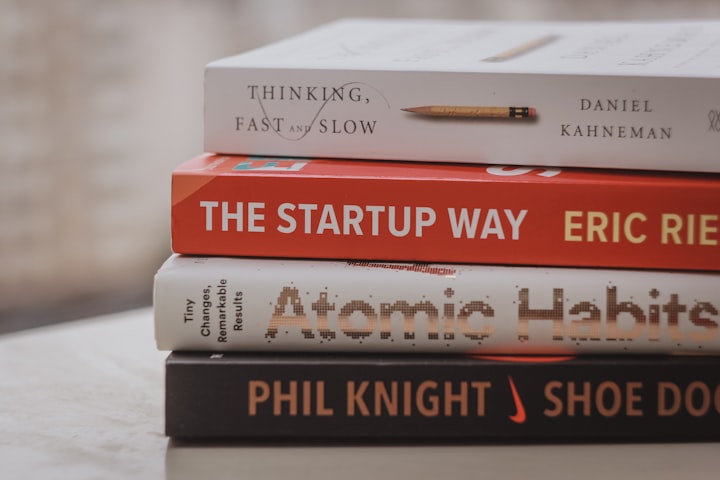Tiny Changes, Remarkable Results
Atomic Habits on why all you need to do is improve by 1% each day
If you’ve decided you want to change your life, chances are you’re probably thinking of making major changes to your lifestyle. Perhaps you’ll start running every morning without fail for an hour, or wake up two hours early each morning starting tomorrow.
But when we actually implement these changes, how long do they really last? Chances are, changes this drastic won’t last for more than a few days at a time, after which you’ll fall back into those same old habits and patterns.
Well why is it like this then?
James Clear, in his book Atomic Habits, describes how we often find drastic changes like this just too difficult to maintain on a consistent basis. Maybe the first day when you wake up at 5 am you feel exhilarated, motivated by your desire for a better life. By the third day, it becomes a chore to wake up that early until, a week later, you’re back to waking up at your usual time.
Instead, the book focuses on the importance of small changes that compound over time to create sustainable change in your life. It focuses on getting just 1% better each day, which might not seem like much, but it results in you getting approximately 37 times better each year. Conversely, if you get 1% worse each day, you would nearly be down to 0 by the end of the year.

This is the power that small changes have. It might not seem like much — in fact, getting 1% better or worse might even look nearly identical at the start — but it’s the factor of time that makes it so powerful.
Consider a long flight, for example, from Toronto to London. If the plane at the beginning of the journey goes even 3° off course, it will end up nearly 300 km away from its destination by the end. Think of how small that change is, a mere 3°. Over time, though, its impact increases to drastically change the course of the plane’s journey.
Similarly, small, minute changes that are nearly invisible will change the course of your life over time.
We tend to overestimate the importance of big goals and changes, but underestimate the power of this continuous improvement that small changes offer us.
It is so easy to dismiss the value these small changes make, simply because they’re so difficult to see at first. Humans like some form of gratification, usually instant, which is why it’s so hard to make these small habits that barely seem to make a difference. It doesn’t seem impressive to get just 1% better each day.
It’s only when you look back after years or maybe even just months that you see the difference they made, which is why it’s so important to stick to them.
How can you implement these ideas?
Thanks to the simplicity of this idea, it is quite simple, albeit not always easy, to implement this into your daily routine.
Start by focusing on things that already work for you, and focus on doing them more consistently. Maybe you floss your teeth, but not often enough for it to mean much, so make it part of your nighttime routine to do that. Or perhaps you enjoy writing thank you notes to people, and feel as though you could do it more often.
Progress in this sense is nearly invisible, but it has lasting impacts that will have immense benefits.
Next, focus on reducing friction in your life. Friction here refers to the issues that stop you from doing what you want. Reducing friction to make good habits easier is one of the best concepts I’ve been able to apply in my daily life.
Take getting out of bed as soon as you wake up. What stops you from doing that? For me, it was planning my day out before I got up. I convinced myself that I was being productive by staying in bed because I was planning what I would have for breakfast, what work I would start off with, and more.
Atomic Habits focuses on reducing this friction, and so I used ideas from it to inspire my own methods. Instead of planning my day out in the mornings, I keep a little notepad next to my bed that I fill in with details of the next day right before I go to bed. That way, I have no reason to stay in bed the next morning.
Do I always get up immediately? Not really, no. But in the past week, I’ve gotten out of bed an average of an hour earlier than I usually did, giving me time to work on my podcast and blog that I always thought I didn’t have through the day.
In the massive scope of the day, it really is such a small difference. But doing it consistently and adding new things to reduce friction — like preparing my laptop at my desk before I sleep — has already made a major difference in just a week, I can’t imagine what it’ll do in a whole year.
And it’s just as simple for you to implement these changes. Try making a list now of things you already do in your daily life, and try to pinpoint the areas of friction that seem to be slowing you down. Next, come up with ways to reduce that friction.
How do I create new habits?
Once you’ve reduced friction and improved parts of your regular routine, start creating new habits.
This seems like the hardest part, simply because of how difficult we think habits are to make, but Atomic Habits sets out a series of steps following the laws of human behaviour change to make good habits easy and bad habits impossible.
- Make it obvious:
Structure your environment in such a way that it is filled with cues to good habits, and hides all the cues to bad habits. If you want to do more yoga, for example, get a yoga mat and place it somewhere that is visible and obvious for when you want to do it.
2. Make it attractive:
Humans are always looking for some sort of reward, and assigning rewards to tasks that are usually arduous makes them not just tolerable, but you look forward to them even.
3. Make it easy:
This is where reducing friction comes into play. By reducing the friction around us and in our environment, we can get to tasks easier and carry them out better, giving us less time to give up on them.
4. Make it immediately satisfying:
We always want instant rewards for doing tasks, and usually “what is immediately rewarded is repeated, while what is immediately punished is avoided.” Consider that hit of dopamine you get scrolling endlessly through social media or going through the McDonald’s drive-through. It’s that dopamine that makes it so easy to repeat bad behaviours, but we can use it to our advantage.
Productivity YouTuber Ali Abdaal mentions that he implemented this in his gym routine, going to the spa and reads for a bit to relax after his workout, giving his brain that instant reward it craves and making these good habits so much easier.
It might not be glamorous, and it isn’t too impressive, but it works.
This article only gives a brief overview of the book, and it is definitely something I would encourage all of you to read if you haven’t already. It’s only been a week and it has already begun to change my daily routine and life in ways that everyone should have access to.
If you enjoy what I write and want to follow me on this journey, consider subscribing to my weekly newsletter! You get bits from my week that I find to be productive or inspirational in my life, as well as some behind the scenes into what I do.
This article was first published on Medium







Comments
There are no comments for this story
Be the first to respond and start the conversation.